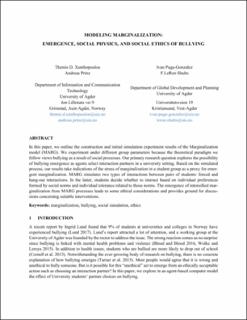| dc.contributor.author | Xanthopoulou, Themis Dimitra | |
| dc.contributor.author | Puga-Gonzalez, Ivan | |
| dc.contributor.author | Prinz, Andreas | |
| dc.contributor.author | Shults, F.LeRon | |
| dc.date.accessioned | 2021-12-08T13:09:21Z | |
| dc.date.available | 2021-12-08T13:09:21Z | |
| dc.date.issued | 2020-05 | |
| dc.identifier.citation | Xanthopoulou, T. D., Puga-Gonzalez, I., Shults, F. L. & Prinz, A. (2020). Modeling Marginalization : Emergence, Social Physics, and Social Ethics of Bullying. In Proceedings of the 2020 Spring Simulation Conference. IEEE. | |
| dc.identifier.isbn | 978-1-56555-370-5 | |
| dc.identifier.uri | https://hdl.handle.net/11250/2833365 | |
| dc.description | Author´s accepted manuscript. | |
| dc.description.abstract | In this paper, we outline the construction and initial simulation experiment results of the Marginalization model (MARG). We experiment under different group parameters because the theoretical paradigm we follow views bullying as a result of social processes. Our primary research question explores the possibility of bullying emergence as agents select interaction partners in a university setting. Based on the simulated process, our results take indications of the stress of marginalization in a student group as a proxy for emer-gent marginalization. MARG simulates two types of interactions between pairs of students: forced and hang-out interactions. In the latter, students decide whether to interact based on individual preferences formed by social norms and individual tolerance related to those norms. The emergence of intensified mar-ginalization from MARG processes leads to some ethical considerations and provides ground for discus-sions concerning suitable interventions. | en_US |
| dc.language.iso | eng | en_US |
| dc.publisher | IEEE | en_US |
| dc.subject | bullying | en_US |
| dc.subject | social simulation | en_US |
| dc.subject | ethics | en_US |
| dc.subject | marginalization | en_US |
| dc.title | Modeling Marginalization : Emergence, Social Physics, and Social Ethics of Bullying | en_US |
| dc.type | Chapter | en_US |
| dc.type | Peer reviewed | en_US |
| dc.description.version | acceptedVersion | en_US |
| dc.rights.holder | © 2020 Society for Modeling & Simulation International | en_US |
| dc.rights.holder | Personal use of this material is permitted. However, permission to reprint/republish this material for advertising or promotional purposes or for creating new collective works for resale or redistribution to servers or lists, or to reuse any copyrighted component of this work in other works must be obtained from the IEEE. | |
| dc.subject.nsi | VDP::Technology: 500::Information and communication technology: 550 | en_US |
| dc.source.pagenumber | 12 | |
| dc.source.volume | 20 | en_US |
| dc.identifier.doi | https://doi.org/10.22360/SpringSim.2020.HSAA.005 | |
